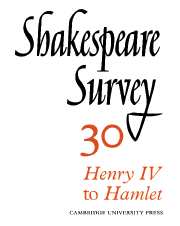Book contents
- Frontmatter
- ‘Henry IV’ and ‘Hamlet’
- Prince Hal and Tragic Style
- The True Prince and the False Thief: Prince Hal and the Shift of Identity
- Falstaff, the Prince, and the Pattern of ‘2 Henry IV’
- Whatever Happened to Prince Hal?: An Essay on ‘Henry V’
- ‘Henry V’ and the Bees’ Commonwealth
- ‘All’s Well that Ends Well’
- ‘Hamlet’ and the Power of Words
- Hamlet the Bonesetter
- ‘Hamlet’: A Time to Die
- Shakespeare, Lyly and Ovid: The Influence of ‘Gallathea’ on ‘A Midsummer Night’s Dream’
- Making a Scene: Language and Gesture in ‘Coriolanus’
- Freedom and Loss in ‘The Tempest’
- Inigo Jones at The Cockpit
- Theory and Practice: Stratford 1976
- The Year's Contributions to Shakespearian Study 1 Critical Studies
- 2 Shakespeare’s Life, Times, and Stage
- 3 Textual Studies
- Index
- Plate Section
The Year's Contributions to Shakespearian Study 1 - Critical Studies
Published online by Cambridge University Press: 28 March 2007
- Frontmatter
- ‘Henry IV’ and ‘Hamlet’
- Prince Hal and Tragic Style
- The True Prince and the False Thief: Prince Hal and the Shift of Identity
- Falstaff, the Prince, and the Pattern of ‘2 Henry IV’
- Whatever Happened to Prince Hal?: An Essay on ‘Henry V’
- ‘Henry V’ and the Bees’ Commonwealth
- ‘All’s Well that Ends Well’
- ‘Hamlet’ and the Power of Words
- Hamlet the Bonesetter
- ‘Hamlet’: A Time to Die
- Shakespeare, Lyly and Ovid: The Influence of ‘Gallathea’ on ‘A Midsummer Night’s Dream’
- Making a Scene: Language and Gesture in ‘Coriolanus’
- Freedom and Loss in ‘The Tempest’
- Inigo Jones at The Cockpit
- Theory and Practice: Stratford 1976
- The Year's Contributions to Shakespearian Study 1 Critical Studies
- 2 Shakespeare’s Life, Times, and Stage
- 3 Textual Studies
- Index
- Plate Section
Summary
Giorgio Melchiori’s brilliant book on the Sonnets (a re-working of the original Italian version published in 1973) has as its sub-title An Experiment in Criticism. Although relying significantly on structuralist analytical techniques it is, nonetheless, critical of their rigorous and abstract application which runs the risk of ‘imprisoning [the poem] in pre-established categories which precede the very act of creation, so as to suppress all truly critical considerations’. Melchiori’s own method is therefore a convergence of a variety of critical approaches, taking into account, for example, structural and linguistic features, sociological and political backgrounds, ideological links with Shakespeare’s other works and those of his contemporaries. Using computer statistical data he points out in what respects Shakespeare’s sonnet sequence is atypical in comparison with those of his contemporaries, notably in its high incidence of the second person and the presence of a dramatic I–thou relationship. However, where such a relationship is not set up and we have ‘meditative’ sonnets a drama is still acted out within the speaker’s mind. Of these, nos. 94, 121, 129, 146 are exceptional in their themes being dramatic meditations on power, social behaviour, sex, and religion, and the book comprises in the main a critique of these four sonnets.
- Type
- Chapter
- Information
- Shakespeare Survey , pp. 181 - 190Publisher: Cambridge University PressPrint publication year: 1977

